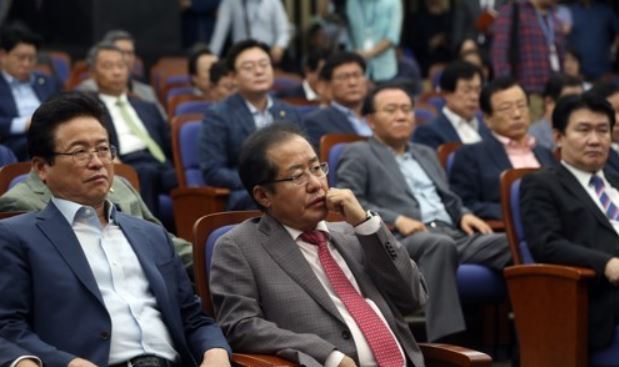Main opposition party returns to parliamentary audit after four-day boycott
By YonhapPublished : Oct. 30, 2017 - 10:37
The main opposition party decided to return to a parliamentary audit of the government on Monday, four days after it launched a boycott to protest what it calls the ruling bloc's attempt to control a local broadcaster.
The Liberty Korea Party launched the boycott on Thursday after two pro-government figures were named to the nine-member board of the Foundation for Broadcast Culture, which has the right as MBC's largest shareholder to pick and fire the broadcaster's president.
The return came amid growing criticism that the conservative party is politicizing the issue and hampering the important parliamentary schedule.
The Liberty Korea Party launched the boycott on Thursday after two pro-government figures were named to the nine-member board of the Foundation for Broadcast Culture, which has the right as MBC's largest shareholder to pick and fire the broadcaster's president.
The return came amid growing criticism that the conservative party is politicizing the issue and hampering the important parliamentary schedule.

"(The boycott) was the least protest we, as an opposition party, had shown against the intrigue to hold sway over the broadcaster," Chung Woo-taik, the party's floor leader, told reporters.
The party made the decision to join the audit at a general meeting of its lawmakers, with some concerned that a prolonged boycott could trigger a backlash ahead of two key events -- South Korean President Moo Jae-in's policy speech at the legislature on Wednesday and US President Donald Trump's rare address next Wednesday.
But the party is poised to ratchet up its campaign against the government. Party lawmakers decided to wear black suits and ties to underscore their claim that the public broadcasters are "dying" due to Moon's media policy.
The ruling Democratic Party has rejected the notion that the government is trying to control MBC. It maintains a legitimate process is underway to "normalize" the broadcaster and help enhance objectivity and reliability in the media. (Yonhap)







![[Graphic News] More Koreans say they plan long-distance trips this year](http://res.heraldm.com/phpwas/restmb_idxmake.php?idx=644&simg=/content/image/2024/04/17/20240417050828_0.gif&u=)
![[KH Explains] Hyundai's full hybrid edge to pay off amid slow transition to pure EVs](http://res.heraldm.com/phpwas/restmb_idxmake.php?idx=644&simg=/content/image/2024/04/18/20240418050645_0.jpg&u=20240419100350)






![[From the Scene] Monks, Buddhists hail return of remains of Buddhas](http://res.heraldm.com/phpwas/restmb_idxmake.php?idx=652&simg=/content/image/2024/04/19/20240419050617_0.jpg&u=20240419175937)

![[KH Explains] Hyundai's full hybrid edge to pay off amid slow transition to pure EVs](http://res.heraldm.com/phpwas/restmb_idxmake.php?idx=652&simg=/content/image/2024/04/18/20240418050645_0.jpg&u=20240419100350)

![[Today’s K-pop] Illit drops debut single remix](http://res.heraldm.com/phpwas/restmb_idxmake.php?idx=642&simg=/content/image/2024/04/19/20240419050612_0.jpg&u=)